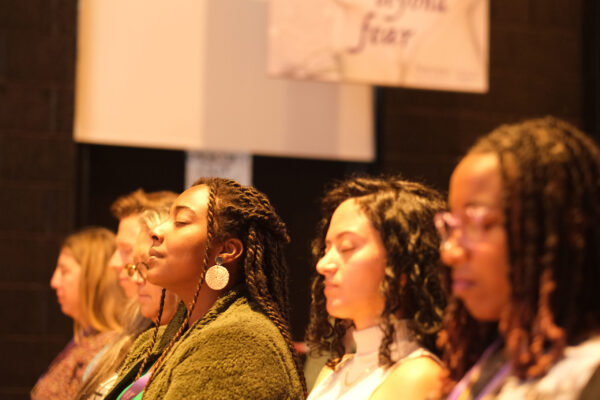Naropa Center For Psychedelic Studies
Program Information
History and Legacy
After 50 Years of intellectual prohibition, a recent resurgence in science and research has demonstrated remarkably promising results for the use of psychedelic substances in the treatment of depression, end-of-life anxiety, addiction, and other mental health conditions. As a leader in the integration of contemplative training with counseling psychology, chaplaincy, eco-psychology and other therapeutic disciplines, Naropa University’s unique positioning has enabled a dedicated team to help expand the unprecedented healing potential within this emerging field.
In 2020, Naropa was pleased to offer a stand-alone training course in MDMA-Assisted Psychotherapy to a small cohort of professionals. Led by Sara Lewis, PhD, LCSW, then Associate Professor of Buddhism-Informed Contemplative Counseling, and other distinguished Naropa faculty, this course was one of the first to partner with MAPS PBC (now Lykos Therapeutics) in offering their nationally-recognized MDMA-assisted therapy education. The program was led by Marcela Ot’alora, an alumnx of Naropa, and Bruce Poulter, who respectively served as Principal Investigator/Clinical Supervisor and Study Therapist/Clinical Supervisor at the MAPS MDMA-assisted therapy Phase III study site in Boulder, Colorado.
 Beginning in 2022, Naropa expanded this pioneering work by creating the innovative Certificate in Psychedelic-Assisted Therapies program. Offered through Naropa Extended Campus under the direction of Austin R. Pick, MA, the certificate was led by Sara Lewis, PhD, LCSW and Jamie Beachy, MDiv, PhD. As one of only a few university programs in Psychedelic-Assisted Therapies available worldwide, this program combined academic and clinical practice expertise with mindfulness and compassion training to provide an in-depth education in essential aspects of this emerging field. The 200-hour certificate provided postgraduate training for advanced professionals working in relevant therapeutic areas, including mental health counseling, medicine, chaplaincy and social work.
Beginning in 2022, Naropa expanded this pioneering work by creating the innovative Certificate in Psychedelic-Assisted Therapies program. Offered through Naropa Extended Campus under the direction of Austin R. Pick, MA, the certificate was led by Sara Lewis, PhD, LCSW and Jamie Beachy, MDiv, PhD. As one of only a few university programs in Psychedelic-Assisted Therapies available worldwide, this program combined academic and clinical practice expertise with mindfulness and compassion training to provide an in-depth education in essential aspects of this emerging field. The 200-hour certificate provided postgraduate training for advanced professionals working in relevant therapeutic areas, including mental health counseling, medicine, chaplaincy and social work.
With the full support of University President Charles G. Lief, the team subsequently established the Naropa Center for Psychedelic Studies (NCPS). Joseph Harrison, MS, was appointed to the position of Executive Director in late 2022, and joined by Diana Quinn, ND as Director of Clinical Education, and Victor Cabral, LSW as Assistant Director of Community Care. NCPS was founded to advance psychedelic therapy, discourse, and research, and to operate with an ecologically-based justice approach and a core mission to relieve suffering and enhance the human experience.
The Certificate in Psychedelic-Assisted Therapies program was offered in 2023 with a larger, more diverse cohort and expanded opportunities for experiential learning. The program again included MDMA-assisted therapy education in close partnership with MAPS PBC. In July 2023, NCPS and Naropa University featured prominently at The Multidisciplinary Association for Psychedelic Studies (MAPS) 2023 Psychedelic Science conference in Denver, the largest such conference in history, with an estimated 12,000 attendees. The Naropa community infused the conference with a unique blend of academic rigor and creative expression.
In 2024 NCPS offered the Certificate in Psychedelic-Assisted Therapies program to its largest-ever cohort, and additionally launched the new Psilocybin Facilitator Training Certificate Program, which was specifically designed to support education and training for legal adult-use psilocybin facilitation under state regulatory models in Oregon and Colorado, and led by Diana Quinn, ND. The new certificate was a 6-month, virtual learning program grounded in a Healing Justice framework, an approach that centers the experience of those most impacted by structural oppression.
In December 2024, Naropa announced the separation and renaming of the Naropa Center for Psychedelic Studies (NCPS) from the university. The newly independent venture, the Memoru Center for Visionary Healing Arts, is a collaboration between the team who founded NCPS and internationally recognized Boulder-based therapists and psychedelic researchers Marcela Ot’alora, Bruce Poulter and Sara Gael Beauregard.
The Work Continues
The Memoru Center for Visionary Healing Arts will feature training and research institutes with plans to open one or more clinics. The mission of Memoru is to create a world where psychedelic and mental health care support the healing and liberation of past, present and future generations in service of a more compassionate humanity.
Developed and supported by NCPS, the Bachelor of Arts Psychedelic Studies Minor will remain at Naropa University, along with existing courses for graduate students.



